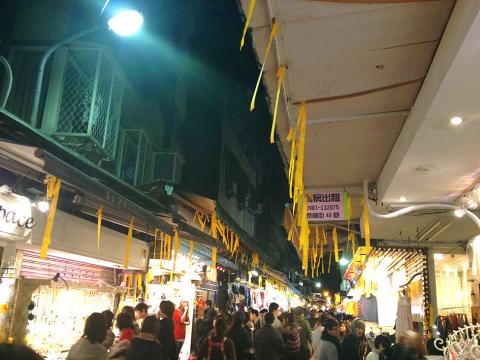Despite protests from local business owners and supporters of the Shida Night Market (師大夜市), Taipei Mayor Hau Lung-bin (郝龍斌) yesterday said the city government was determined to ban the market from expanding further and insisted on its efforts to turn the area into what it called a “college town.”
The city government’s recent crackdown on illegal vendors at one of Taipei’s busiest tourist attractions sparked disputes over whether local vendors should face eviction and going out of business or whether the night market should be preserved.
Hau yesterday reiterated the city government’s plan to turn the market around National Taiwan Normal University, also known as Shida, into a college town to maintain a clean and safe environment for students and residents.

Photo: CNA
“The scope of the Shida market and its surrounding business area should not be expanded further. The city government will continue to enforce the regulations and demand that all vendors cooperate with the regulations,” he said at Taipei City Hall.
Taipei City Government spokesman Chang Chi-chiang (張其強) dismissed concerns that the crackdown would result in the night market disappearing and insisted that the city government would seek a consensus with vendors and local residents on keeping the night market, while creating a high-quality environment.
“However, a consensus will only be reached if local vendors are willing to follow the regulations and keep the environment clean and safe,” he added.
Disputes over the night market began after Hau announced in November last year that the expansion of the market would be banned in response to growing complaints from local residents about the trash and noise caused by vendors and visitors.
Hau said problems relating to noise, unpleasant odors from restaurants and issues with public safety violate the rights of residents and he instructed officials to conduct regular inspections and random checks.
The city government has since issued notices to about 75 vendors who seriously violated the regulations and instructed them to improve conditions to avoid having their business evicted.
Taipei Deputy Mayor Chen Hsiung-wen (陳雄文) said part of the night market is classified as a residential zone and according to land-use regulations, roads less than 8m wide in residential zones cannot be used for commercial purposes.
The crackdown sparked protests from local vendors, who urged the Taipei City Government to support the market.
The vendors’ self-help association spokesman, Ker Yu-you (柯裕佑), yesterday heaped more criticism on the city government’s crackdown, saying the government had failed to initiate any talks on the issue.
“So far, city officials have said nothing to indicate that they are willing to discuss the issue and the city government has not sent anyone to help vendors improve any illegal conditions,” he said.
Ker said the city government should not issue operation permits to those who violate regulations and said it should work with vendors to improve conditions and keep the night market as a major tourist attraction.
“If the city government insists on the crackdown, it should do the same to other night markets. Targeting only Shida Night Market is unfair,” he said.

‘DENIAL DEFENSE’: The US would increase its military presence with uncrewed ships, and submarines, while boosting defense in the Indo-Pacific, a Pete Hegseth memo said The US is reorienting its military strategy to focus primarily on deterring a potential Chinese invasion of Taiwan, a memo signed by US Secretary of Defense Pete Hegseth showed. The memo also called on Taiwan to increase its defense spending. The document, known as the “Interim National Defense Strategic Guidance,” was distributed this month and detailed the national defense plans of US President Donald Trump’s administration, an article in the Washington Post said on Saturday. It outlines how the US can prepare for a potential war with China and defend itself from threats in the “near abroad,” including Greenland and the Panama

A wild live dugong was found in Taiwan for the first time in 88 years, after it was accidentally caught by a fisher’s net on Tuesday in Yilan County’s Fenniaolin (粉鳥林). This is the first sighting of the species in Taiwan since 1937, having already been considered “extinct” in the country and considered as “vulnerable” by the International Union for Conservation of Nature. A fisher surnamed Chen (陳) went to Fenniaolin to collect the fish in his netting, but instead caught a 3m long, 500kg dugong. The fisher released the animal back into the wild, not realizing it was an endangered species at

The High Prosecutors’ Office yesterday withdrew an appeal against the acquittal of a former bank manager 22 years after his death, marking Taiwan’s first instance of prosecutors rendering posthumous justice to a wrongfully convicted defendant. Chu Ching-en (諸慶恩) — formerly a manager at the Taipei branch of BNP Paribas — was in 1999 accused by Weng Mao-chung (翁茂鍾), then-president of Chia Her Industrial Co, of forging a request for a fixed deposit of US$10 million by I-Hwa Industrial Co, a subsidiary of Chia Her, which was used as collateral. Chu was ruled not guilty in the first trial, but was found guilty

The Chinese Nationalist Party (KMT) is maintaining close ties with Beijing, the Democratic Progressive Party (DPP) said yesterday, hours after a new round of Chinese military drills in the Taiwan Strait began. Political parties in a democracy have a responsibility to be loyal to the nation and defend its sovereignty, DPP spokesman Justin Wu (吳崢) told a news conference in Taipei. His comments came hours after Beijing announced via Chinese state media that the Chinese People’s Liberation Army’s Eastern Theater Command was holding large-scale drills simulating a multi-pronged attack on Taiwan. Contrary to the KMT’s claims that it is staunchly anti-communist, KMT Deputy